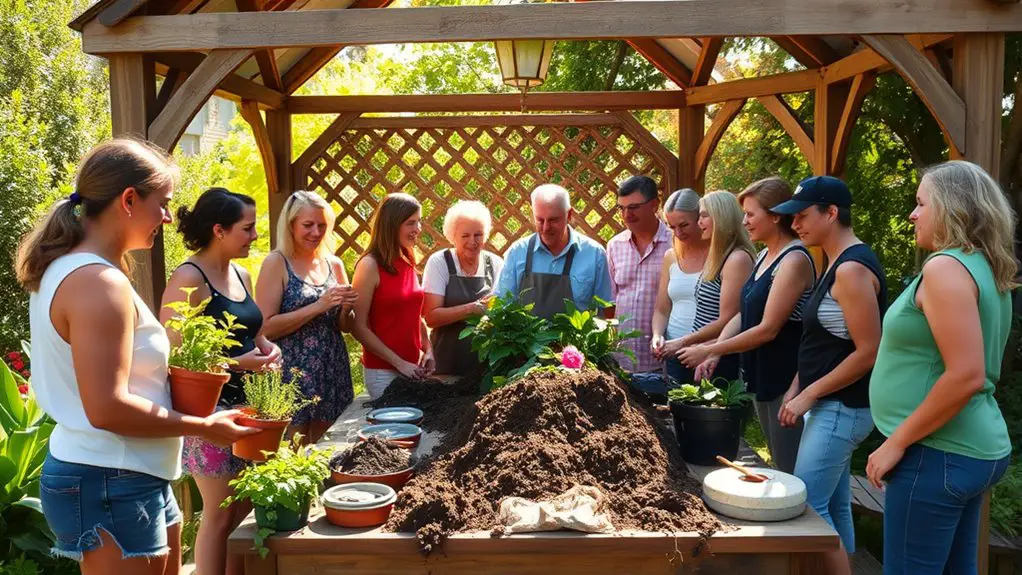Hosting a composting workshop in your gazebo can be a fantastic way to connect with your community. Choose a date in spring or early fall for the best weather. Gather essential materials like composting tools, seating, and informative handouts. Set up the gazebo with a semi-circle of chairs and a central table for demonstrations. Engage participants through interactive activities and a Q&A session. If you’re curious about tips for promoting your workshop and more, there’s plenty more to explore!
Choosing the Right Date and Time
When’s the best time to host your composting workshop? Timing’s everything, and you want to align your event with favorable weather considerations. Spring and early fall typically offer pleasant temperatures and less rain, making your gazebo the perfect spot for hands-on activities. Additionally, ensure that your gazebo is constructed from durable materials to withstand any unexpected weather changes during the workshop.
Next, check your community’s availability. Look at local events or holidays that might conflict with your workshop. You want to maximize attendance, so consider weekends when people are more likely to be free.
Also, think about the time of day. Late mornings or early afternoons often work best, allowing participants to enjoy the session without feeling rushed.
Gathering Essential Materials
To guarantee your composting workshop runs smoothly, it’s crucial to gather all the essential materials ahead of time. Start by collecting the necessary composting tools, like pitchforks, shovels, and bins. These will help participants engage actively and get hands-on experience. Don’t forget to include workshop supplies such as gloves, aprons, and labels for different compost ingredients.
You’ll also want to have a clear list of compostable and non-compostable items handy; this will guide your discussions and clarify any confusion. If you’re planning to demonstrate specific techniques, consider preparing examples of different compost setups or even bringing in samples of finished compost.
Lastly, guarantee you have enough seating and workspace in your gazebo to accommodate everyone comfortably. By taking these steps to gather your materials, you’ll create a fun and enlightening atmosphere where everyone feels free to explore the world of composting!
Setting Up the Gazebo for the Workshop
With all your materials in place, it’s time to focus on setting up the gazebo for your composting workshop. Create an inviting space that makes participants feel comfortable and engaged. Here’s how to transform your gazebo:
- Seating arrangement: Use chairs or benches arranged in a semi-circle for better interaction.
- Lighting options: Consider string lights or lanterns to enhance visibility as evening approaches.
- Demonstration area: Set up a central table where you can showcase composting techniques.
- Visual aids: Hang posters or provide handouts with composting tips to spark interest.
- Personal touches: Add plants or decorations that reflect your passion for composting and sustainability. Additionally, make sure to install mosquito netting to keep pests away, ensuring a pleasant environment for your workshop.
Promoting Your Workshop
Although it might seem intimidating, promoting your composting workshop can be both fun and rewarding. Start by utilizing social media platforms to spread the word. Create engaging posts with eye-catching visuals and clear calls to action. Don’t forget to connect with local partnerships! Collaborate with community gardens, environmental organizations, or even local businesses to broaden your reach.
Here’s a simple table to help you organize your promotional strategies:
| Strategy | Description | Platform/Partner |
|---|---|---|
| Social Media Blitz | Posts, stories, and event pages | Facebook, Instagram |
| Local Partnerships | Joint promotions and sponsorships | Community groups, shops |
| Flyers & Posters | Eye-catching visuals in local spots | Libraries, coffee shops |
Creating an Informative Agenda
Once you’ve spread the word about your composting workshop, the next step is to create an informative agenda that keeps participants engaged and excited. A well-structured agenda layout can enhance the experience by clearly outlining what to expect. Focus on topic prioritization to guarantee you cover the essentials while allowing for flexibility.
Consider including these key points in your agenda:
- Introduction to Composting: Brief overview and benefits.
- Types of Composting: Differences between hot, cold, and vermicomposting.
- Materials to Use: What goes in and what to avoid.
- Maintenance Tips: How to care for your compost pile.
- Q&A Session: Open floor for questions and discussions.
Engaging Participants During the Workshop
How can you make your composting workshop truly memorable for participants? Start by incorporating interactive activities that spark enthusiasm. Break the group into smaller teams for hands-on tasks, like building a mini compost pile or sorting organic materials. This not only enhances their learning experience but also fosters camaraderie among participants.
Encourage participant testimonials throughout the workshop. Ask attendees to share their thoughts on composting or their own experiences with it. This creates a welcoming atmosphere where everyone feels valued and heard.
Encourage participants to share their composting experiences, fostering a welcoming atmosphere where everyone feels valued and heard.
Consider having a Q&A session where participants can voice their concerns or curiosities, further engaging them in the conversation.
Lastly, remember to follow up after the workshop. Send a quick survey or an email asking for feedback and additional testimonials. This not only strengthens your community but also helps you improve future workshops, making them even more enriching for everyone involved.
Demonstrating Composting Techniques
Showcase the art of composting by demonstrating various techniques that participants can easily replicate at home. By highlighting different composting methods, you’ll empower them to embrace sustainability. Here are some effective techniques to cover:
- Bokashi Composting: A fermentation method that’s great for small spaces.
- Vermicomposting: Using worms to break down kitchen scraps into nutrient-rich compost.
- Hot Composting: A method that accelerates decomposition using heat, perfect for larger amounts of waste.
- Sheet Composting: Layering organic materials directly onto the soil, enriching it over time.
- Tumbler Composting: A rotating bin that simplifies mixing and aeration for faster results.
Following up With Participants
While the workshop may have ended, your journey into composting doesn’t have to stop there. Following up with participants is essential for building a community and ensuring everyone feels supported. Start by collecting feedback; this helps you understand what worked well and what could be improved for future workshops. Consider sending a short survey via email or social media to gather insights.
Next, focus on resource sharing. Create a digital space where participants can exchange tips, successes, and challenges. You might set up a group chat or a social media group dedicated to composting discussions. This not only fosters a sense of community but also encourages everyone to stay engaged with their composting efforts.
Frequently Asked Questions
What Should I Wear for a Composting Workshop?
For a composting workshop, wear weather-appropriate attire and comfortable footwear. Think layers for warmth or breathability, depending on conditions. You’ll want to stay relaxed while digging into all the green goodness!
Can Children Attend the Workshop?
Absolutely, kids can attend! They’ll be amazed by how composting can turn scraps into garden gold. Engaging children in this process teaches them valuable benefits of sustainability and encourages their love for the environment.
How Long Will the Workshop Last?
The workshop schedule typically spans two hours, with each session duration lasting about 90 minutes. You’ll have plenty of time to learn, ask questions, and connect with others who share your passion for composting!
Is There a Fee to Participate?
No, there isn’t a fee to participate! You’ll just need to follow the registration process. Payment options are flexible, ensuring you can secure your spot easily. Join in and enjoy the experience without financial worries!
What if It Rains on the Workshop Day?
Did you know 30% of waste can be composted? If it rains, don’t worry! You’ve got alternative locations ready, and with proper weather preparations, you can still enjoy a productive workshop without a hitch.

